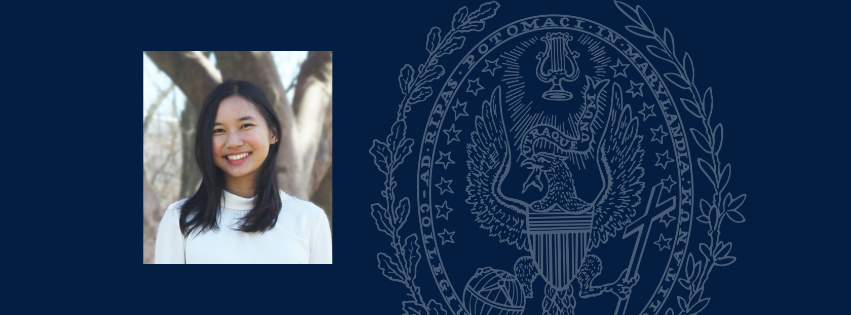Cynthia Ng (G’24) Reflects on International Women’s Day
The Graduate School joins the university and nation in celebrating and honoring women during Women’s History Month. We invite you to read the story of Cynthia Ng: she is from Hong Kong and will be graduating with a Master of Science in Data Science & Analytics in May. Ng shares her reflections on International Women’s Day and advice for women/womxn who want to attend Georgetown.
Why did you choose to attend Georgetown?
“I chose to attend Georgetown, first, because it is located in Washington, DC. During my undergraduate studies, I did a work-study semester in DC and fell in love with the city’s mix of politics, arts, and culture and its public transit system, all of which allowed me to explore and meet people outside of the bubbles I found myself in. Second, because I studied international relations during my undergraduate years and was applying for graduate programs in data science, I was drawn to Georgetown’s network in policy and social sciences, as I was ultimately drawn to using data for social good and wanted to meet people from diverse disciplines.
“Since then, in the nearly two years I’ve been at Georgetown, I can confirm that Georgetown has been a space where I’ve grown immensely. I’ve learned from incredibly intelligent, interdisciplinary, and caring professors and peers in my program as well as student organizations like GradGov — Georgetown’s graduate student government — that foster collaboration between students from different programs and shared interests.”
What does International Women’s Day mean to you?
“I think International Women’s Day and Women’s History Month are important reminders for us of the ongoing efforts we’ve made in uplifting the voices of women/womxn. It’s a recognition that unjust structures, maintained by people in power, have often suppressed the voices of women and people from marginalized backgrounds. As a result, it requires a lot of intentionality to give space to and invest in women. I think many women understand the obstacles we face, so it may be ironic to discuss gender equity in a room full of women.
“At the end of the day, we need men to care, to participate. To recognize the barriers that women face in all facets of life – from being socialized to believe that we are inhibited from joining many professions and high-ranking positions, to being excluded in key discussions, to experiencing gender-based violence – that invariably affect men negatively too, like in the manifestation of toxic masculinity, where men in care-taking roles or with effeminate features are shamed for being who they are, where vulnerability is shamed. It means recognizing the interactions of other facets of identity – race, sexual orientation, disability, and class, for example – that come into play too. It means taking the time to listen to each other, to respect, value, and include women in discussions.”
“International Women’s Day and the larger recognition of Women’s History Month is a reminder for us to take the time to understand nuances, to share our views, to discuss, and to involve each other, especially people in power, to create a more just and better world.”
– Cynthia Ng
“If you are invited to a panel that features no women, it may mean bringing up the names of women who you think are qualified to speak to the topic you’re asked to share on. If you’re a teacher, it may mean including the works and stories of women who are often excluded from the “canon”; for example, if you are teaching about DNA, it’s talking about Rosalind Franklin’s expertise in X-ray crystallography, which was crucial to the discovery of DNA often credited solely to James Watson and Francis Crick.
“To me, International Women’s Day and the larger recognition of Women’s History Month is a reminder for us to take the time to understand nuances, to share our views, to discuss, and to involve each other, especially people in power, to create a more just and better world – something that we should strive to do every single day.”
Do you celebrate Women’s History Month?
“I don’t particularly celebrate Women’s History Month, mostly because it’s not as commonly celebrated in Hong Kong, where I’m from, and partly also because I tend to get apprehensive about performative and even commodified celebrations. However, I do celebrate International Women’s Day as people in my life do as well, by messaging people close to me and thanking them for helping me grow and uplifting me.
“It’s always a heartfelt reminder of the strides that I’ve made, and am continuing on. Many platforms also tend to feature more books, media and content from women and people who value and demonstrate inclusion of all genders, which helps me learn about the work of more women too.”
What advice would you give to women/womxn who want to attend Georgetown University?
“The advice I’d want to give women/womxn who want to attend Georgetown is, join the communities that you see yourself thriving in. The best way to know that is to reflect on what matters most to you in this unique school experience, and to read online about, and potentially reach out to, these communities — perhaps it’s a professor teaching a class you’re interested in taking, or an organization you’d like to learn more about. If Georgetown is in that picture for you, that makes me so excited, and if you don’t, that’s wonderful too! Only you will know what is best for you.”
What’s your favorite quote that celebrates women in history?
“When we are willing to risk venturing into the wilderness, and even becoming our own wilderness, we feel the deepest connection to our true self and to what matters the most.” – Brené Brown
